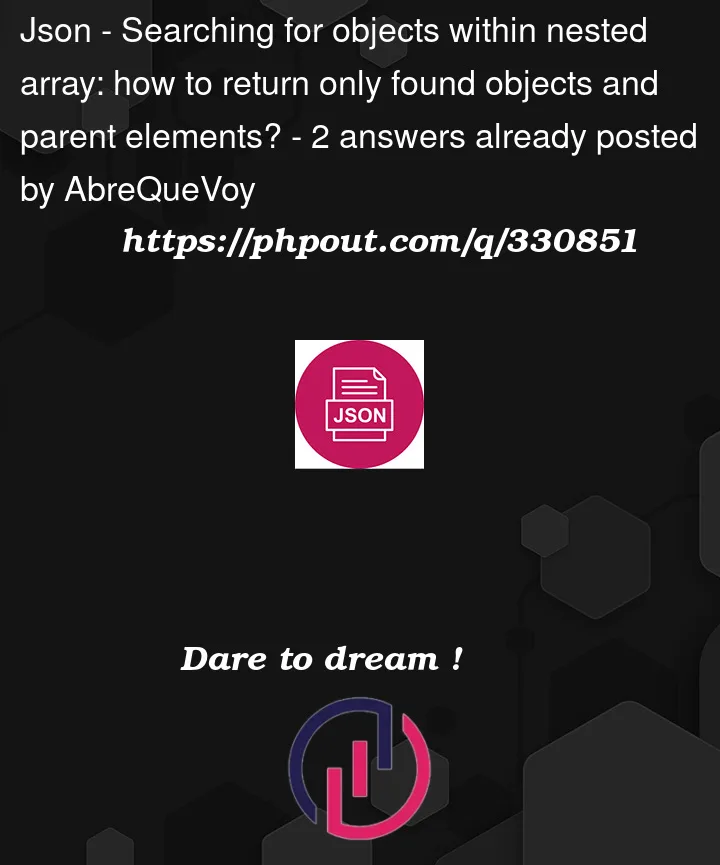Here’s an excerpt from pictures MongoDB collection:
[
{
"_id": "57582b6b",
"source": "integration",
"url": "https://example.com/images/51/landscapes-polar.xml",
"pictures": [
{
"name": "pines",
"version": "2"
},
{
"name": "penguins",
"version": "1"
},
{
"name": "pineapple",
"version": "7"
}
]
},
{
"_id": "57582b6d",
"source": "customer",
"url": "https://example.com/images/15/nature.xml",
"pictures": [
{
"name": "mountains",
"version": "2"
},
{
"name": "pines",
"version": "1"
}
]
},
{
"_id": "57582b6c",
"source": "qa",
"url": "https://example.com/image/32/landscapes.xml",
"pictures": [
{
"name": "alps",
"version": "1"
},
{
"name": "pineapple",
"version": "7"
},
{
"name": "pines",
"version": "3"
}
]
}
]
My main concern is to find specific names from inside of nested pictures array. When names matching partial query string are found, they should be preserved in pictures array and displayed along with pictures‘s array parent. Using PyMongo library, I was able to retrieve queried data using this function:
import re
from flask import Flask, jsonify
from controller.database import client, database_name, temp_collection
app = Flask(__name__)
db = client[database_name]
collection = db[temp_collection]
@app.route('/component/find/<picture_name>', methods=['GET'])
def get_component(picture_name):
pattern = re.compile(picture_name, re.IGNORECASE)
pipeline = [
{"$unwind": "$pictures"},
{"$match": {"pictures.name": {"$regex": pattern}}},
{"$group": {
"_id": "$_id",
"url": {"$first": "$url"},
"source": {"$first": "$source"},
"pictures": {"$addToSet": "$pictures"},
"root": {"$first": "$$ROOT"}
}},
{"$replaceRoot": {
"newRoot": {
"$mergeObjects": ["$root", {"pictures": "$pictures"}]
}
}},
{"$project": {
"_id": {"$toString": "$_id"},
"url": 1,
"source": 1,
"pictures": 1
}}
]
result = list(collection.aggregate(pipeline))
if result:
return jsonify(result)
else:
return jsonify({"message": "Component with picture '{}' not found.".format(picture_name)}), 404
if __name__ == "__main__":
app.run(debug=True)
However, retrieved data only contains one-element pictures arrays, instead of putting there all matching objects.
In other words, this is what I’d like to get:
[
{
"_id": "57582b6b",
"source": "integration",
"url": "https://example.com/51/landscapes-polar.xml",
"pictures": [
{
"name": "pines",
"version": "2"
},
{
"name": "pineapple",
"version": "7"
}
]
},
{
"_id": "57582b6d",
"source": "customer",
"url": "https://example.com/15/nature.xml",
"pictures": [
{
"name": "pines",
"version": "1"
}
]
},
{
"_id": "57582b6c",
"source": "qa",
"url": "https://example.com/image/32/landscapes.xml",
"pictures": [
{
"name": "pineapple",
"version": "7"
},
{
"name": "pines",
"version": "3"
}
]
}
]
and this is what I get now:
[
{
"_id": "57582b6b",
"source": "integration",
"url": "https://example.com/51/landscapes-polar.xml",
"pictures": [
{
"name": "pines",
"version": "2"
}
]
},
{
"_id": "57582b6d",
"source": "customer",
"url": "https://example.com/15/nature.xml",
"pictures": [
{
"name": "pines",
"version": "1"
}
]
},
{
"_id": "57582b6c",
"source": "qa",
"url": "https://example.com/image/32/landscapes.xml",
"pictures": [
{
"name": "pineapple",
"version": "7"
}
]
}
]
How to make sure all matching pictures objects get pushed to proper arrays? (Using $push instead of $addToSet returns the same results.)




2
Answers
Using Mongo Playground, I was able to build up the query step by step and found out that removing some markup results in responding with the contents I wanted. The Flask app should be set up this way:
You’re on the right track with your current approach, but there’s a small adjustment needed to achieve the desired outcome. The issue lies in the $group stage, where you currently use $addToSet for the pictures field. While this prevents duplicates, it also limits the array to only one matching element.
You can modify your pipeline to capture all matching pictures objects:
Changes Made:
Within the $group stage, instead of $addToSet, use $push for the
pictures field.
Inside the $push expression, use mergeObjects to combine the entire document
(
$ROOT) with the matchingpicturesobject. This essentially adds the whole document with the specificpicturesobject to the array.With this modification, your aggregation pipeline will collect all matching pictures objects within each document while retaining the parent document information. This should provide the desired output you described.